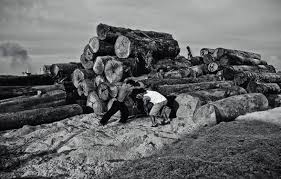(单词翻译:单击)
中英文本
Books & arts
文艺板块
Book review
书评
The Peruvian Amazon
秘鲁的亚马逊热带雨林
The wood from the trees
雨林困境
Wars of the Interior. By Joseph Zarate. Translated by Annie McDermott.
《林内战争》。作者:约瑟夫·萨拉特。翻译:安妮·麦克德莫特。
Osman Cunachi was practising free kicks one afternoon in 2016 when thick black oil from a crack in a nearby pipeline started oozing into the Chiriaco river. The 11-year-old member of the Awajun tribe, the second-largest indigenous nation in Peru, heard that government engineers were paying people to clean up the spill. His family was one of dozens who waded into the water with buckets and plastic bottles. Sick from the fumes, his four-year-old brother was the first to give up. Osman stayed in until it got dark, hoping to earn enough to buy a smartphone. In a photo taken that day he is covered in black smears, smiling and swinging his bucket.
2016年的一个下午,奥斯曼·库纳奇在练习任意球时,稠密的黑油从附近一条输油管道的裂缝中开始渗入奇里亚科河。11岁的奥斯曼是秘鲁第二大土著民族Awajun部落的成员,他听说政府工程师正在花钱请人清理泄露的黑油。他的家人也加入了清理行列,一行几十人拿着水桶和塑料瓶蹚进奇里亚科河中。他四岁的弟弟因难耐黑油味而成为第一个放弃的人。奥斯曼一直呆到天黑,他希望挣到足够的钱买一部智能手机。在当天拍摄的一张照片中,浑身都是黑色污迹的奥斯曼微笑着摇晃水桶。

“It’s a perverse paradox of development that something as horrific as an oil spill and the death of a river could temporarily benefit a town,” writes Joseph Zarate, a Peruvian journalist, in “Wars of the Interior”. Each of his chapters investigates how a commodity extracted from the rainforest— wood, gold, oil—has changed the lives of the locals, mostly for the worse. Mr Zarate acknowledges that these industries have helped Peru and its Amazonian neighbours grow and modernise. But, he argues, too little thought has been given to the trade-offs. Rifts in Peruvian society over the exploitation of natural resources too often end in violence. A war is raging between “ clashing visions of progress” , and indigenous people are losing.
秘鲁记者约瑟夫·扎拉特在《林内战争》一书中写道:“像石油泄漏和河流死亡这样可怕的事情却可能让一个城镇暂时受益,这是一个有悖常理的发展悖论。”他的每一章节都探讨了取自雨林的一种商品(木材、黄金、石油)是如何改变当地人的生活的,其中大多数人的生活实际变得更糟。扎拉特承认,这些产业帮助秘鲁及其亚马逊邻国实现了发展和现代化。但他认为,当地政府在权衡方面考虑的太少了。秘鲁社会在自然资源开发问题上的分歧往往以暴力收尾。一场战争正在“进步愿景的冲突”间肆虐,而土著人民正在输掉这场战争。
Many books about the Amazon cast its inhabitants as passive victims , or idealise them as guardians of the forest. Mr Zarate does neither. His subjects don’t oppose development itself — Osman’s father wants him to become a petroleum engineer — but rather the brutal way it has intruded on their lives. They are resilient and stubborn, but they are clearly outgunned. An Ashaninka chief sees no choice but to fight illegal loggers who are chopping down trees on his tribe’s reserve. He gets killed. A Quechua potato farmer can’t imagine selling her land for a pittance so that a mining company can dredge up a yellow metal of no value to her. Her house is burned down. Doctors find dangerous arsenic, lead and mercury in little Osman’s blood. He just wants to be “ a normal kid, and not be scared of getting a tumour one day”.
许多关于亚马逊河流域的书籍将当地居民视为被动受害者,或者把他们理想化为森林的守护者。扎拉特在自己的书中并没有采取任意一种描述。他笔下的主人公们并不反对发展本身,(比如,奥斯曼的父亲希望他成为一名石油工程师),他们反对的是发展对他们生活造成的残酷影响。他们坚韧而固执,但他们显然是被打败了。Ashaninka酋长认为,除了去惩罚那些在他的部落保护区砍树的非法伐木者,他们别无选择。结果他被杀害了。克丘亚部落的一名马铃薯种植户怎么也没想到,为了让一家矿业公司挖掘一种对她毫无价值的黄色金属,她会以微薄的价格卖掉自己的土地。结果她的房子被烧毁了。医生在小奥斯曼的血液中发现了危险的砷、铅和汞。小奥斯曼只想成为“一个正常孩子,他并不害怕自己有一天会得肿瘤”。
译文由可可原创,仅供学习交流使用,未经许可请勿转载。
词语解释
1. The 11-year-old member of the Awajun tribe, the second-largest indigenous nation in Peru, heard that government engineers were paying people to clean up the spill.
clean up 清理
And muggins here had to clean up all the mess.
而我这个傻瓜现在不得不清理这个烂摊子。
2. A Quechua potato farmer can’t imagine selling her land for a pittance so that a mining company can dredge up a yellow metal of no value to her.
dredge up 挖掘,重提
I wouldn't want to dredge up the past
我不想重提往事。


